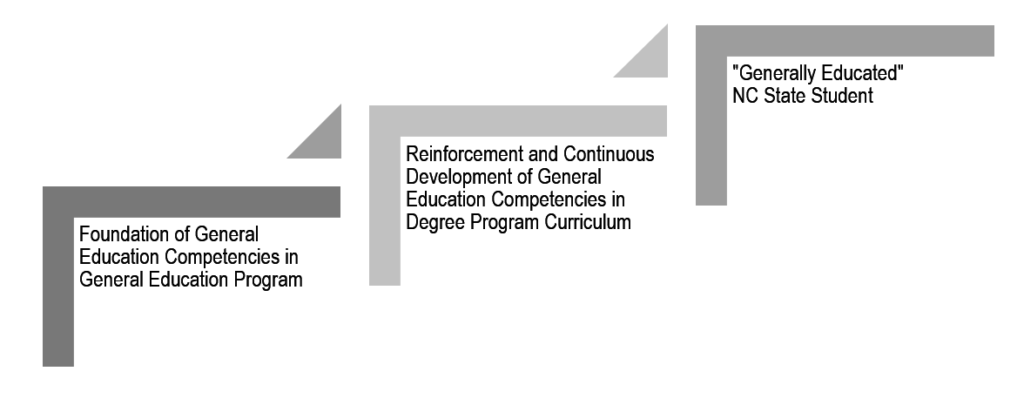Frequently Asked Questions
What are the Pack Proficiency Competencies?
The assessment of General Education Competencies, called the “Pack Proficiencies,” at NC State is coordinated through the Office of Assessment and Accreditation and DASA Assessment in the Division of Academic and Student Affairs (DASA). These competencies were selected by NC State faculty because they are fundamental across disciplines and degree programs. Pack Proficiency Competencies are introduced through multiple and sustained experiences across the GEP. It is then expected that each degree program provides additional support to build upon that foundation throughout the major.
The Pack Proficiency Competencies were identified and defined by NC State faculty and vetted through the Faculty Senate, the Council on Undergraduate Education, and the Associate Deans in spring 2012. There are 5 Pack Proficiency Competencies: Critical Thinking, Creative Thinking, Written Communication, Oral Communication, and Quantitative Literacy. Each competency has a definition and associated outcomes.
Are the Pack Proficiency Competencies different from the General Education Program (GEP)?
Yes. The General Education Program (GEP) is a series of coursework (39 credit hours across 8 GEP categories) that NC State students are required to complete. The mission of general education is to provide students the opportunity to experience diverse and integrative disciplinary perspectives.

As noted previously, the Pack Proficiency Competencies are competency areas in which NC State students should develop during their undergraduate careers. Development in these competencies begins in the GEP and is sustained throughout their major coursework. The Pack Proficiency program was renamed to prevent confusion with the General Education Program.
How are the Pack Proficiency Competencies assessed?
Pack Proficiency Competency Assessment efforts measure undergraduate proficiency levels in each competency area. The Office of Assessment and Accreditation and DASA Assessment partner with faculty from across campus to collect and analyze data for Pack Proficiency Competency Assessment, including authentic assessment artifacts and standardized assessments.
For example, authentic assessment evidence of student work is collected and scored by assessment staff and faculty partners for oral and written communication competencies using rubrics. The Office of Assessment and Accreditation and DASA Assessment assess written communication, quantitative literacy, and critical thinking for first-year and senior students using the Critical Thinking Assessment Test (CAT) and HEIghten Quantitative Literacy Assessment. The resulting data are shared through faculty champions with faculty and administrators throughout the university to make decisions to improve student learning.
How can faculty partner with assessment staff to improve student learning in Pack Proficiency Competency areas?
There are a number of opportunities for faculty to work with the Office of Assessment and Accreditation and DASA Assessment to improve student learning within the Pack Proficiency Competencies. These competencies were selected by NC State faculty given that they are fundamental across disciplines and degree programs. As such, many degree programs have explicit student learning outcomes tied directly to one or more of the Pack Proficiency Competencies. Opportunities to collaborate:
- Assessment staff work with faculty who have course or program level student learning outcomes related to Pack Proficiency competencies to use rubrics, standardized assessments, and other assessment tools to collect data on student learning. The Office of Assessment is able to facilitate the administration of the assessment (often in conjunction with faculty) and then provides course/program level data back to the department. These data can be used to inform annual academic assessment reporting.
- Assessment staff and Pack Proficiency Competency Champions offer consulting and professional development training opportunities for faculty who seek ways to integrate teaching in the competency areas in their course and curriculum. These opportunities are shared on our website and through email communications.
How are the data used?
The goal of the Office of Assessment and Accreditation and DASA Assessment is to share findings from Pack Proficiency Competency assessments with campus stakeholders for the purpose of continually improving student learning. Assessment staff and Pack Proficiency Competency Champions regularly share data with stakeholders such as faculty, staff, and administrators across the university to make decisions to improve student learning. Directors of Undergraduate Programs and NC State faculty may request aggregated program-level assessment data for use in their annual Academic Program Assessments or for other student learning assessments.
For example, during the 2017-2018 academic year, assessment staff worked with the Poole College of Management to administer the HEIghten Quantitative Literacy Assessment to 300 graduating seniors. Additionally, 20 faculty across 6 colleges partnered with assessment staff to administer competency assessments using a variety of assessment tools.
Who are the Pack Proficiency Competency Champions?
The Office of Assessment and Accreditation in partnership with DASA Assessment has identified a faculty champion for each of the Pack Proficiency Competencies. The role of Pack Proficiency Competency Champions is to engage with faculty across disciplines and encourage improvement in student learning through teaching and use of assessment data. Faculty then use these data to make decisions about courses and curricula related to the competency. Champions work closely with assessment staff to collect evidence of how faculty across campus are specifically using data to improve student learning. Faculty were selected as champions based on their content area expertise and their interest in assessment and faculty development. Learn more about the current Pack Proficiency Competency Champions.
Who can I contact for more information?
For more information about Pack Proficiency Competency Assessment, please contact:
Samantha Rich
Director, DASA Assessment
919.513.0912